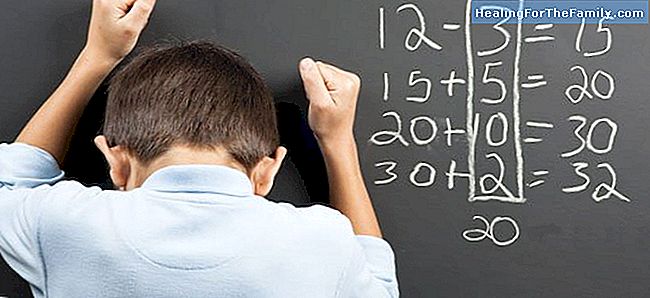Dyscalculia: difficulties in mathematical reasoning in children
One of the learning difficulties that children can present in their school stage is related to mathematics and mathematical reasoning , and is what is called dyscalculia . This difficulty may or may not be accompanied by other learning disorders such as dyslexia or attentional difficulties. Many tim
One of the learning difficulties that children can present in their school stage is related to mathematics and mathematical reasoning, and is what is called dyscalculia. This difficulty may or may not be accompanied by other learning disorders such as dyslexia or attentional difficulties.
Many times we think that the children's difficulties with mathematics are related to the subject itself, (it is difficult, it does not interest the child, it does not make enough effort ...) but we do not think that after these difficulties or bad grades in mathematics there may be a problem in the background, a specific difficulty that affects the learning of this subject.
Children with difficulties in learning mathematical reasoning

It must be taken into account, as in the rest of the learning difficulties, that all children can present problems in learning mathematics at some point during their school years, but they are not due to a specific learning difficulty, therefore it is important to distinguish when we talk about dyscalculia and when not. Dis Dyscalculia is a persistent disorder, and it affects the learning of mathematics in general and not to concrete contents. For the development of mathematical learning, prior skills or prerequisites are necessary, which if not correctly acquired, can give rise to problems with mathematics: La - Attention, memory, reasoning and perception, (visuospatial organization, perception auditory, short and long term verbal memory, seriation and sequencing skills ...)
- Adequate linguistic development, good level of reading comprehension.
- Acquisition of basic concepts (size, shape, quantity, order, position)
- Body knowledge (body scheme, adequate lateralization).
To all this we must add the cognitive development of the child, which in its different stages, will allow him to face increasingly abstract tasks. As not all children develop at the same pace, facing certain tasks before being prepared, it can also lead to difficulties, but little by little they disappear.
But yes, these difficulties persist above what is considered normal by age and school stage, we can speak of a
Specific difficulties of mathematics.
What is dyscalculia and how it affects children Dyscalculia is a learning difficulty that affects children with an adequate level of cognitive development, a good performance in learning, but it is difficult for them to understand the numerical notions or perform arithmetic calculations. This difficulty manifests itself in different degrees. They can present:
- Problems to write the numbers correctly.
- Problems learning to perform basic mathematical operations.
- Problems to
perform and solve mathematical reasoning questions.
In dyscalculia, the following may appear: - Perceptual, visuospatial, and visuoconstructive difficulties (spatial organization, recognizing mathematical signs and symbols, position of numbers, identification of numbers, notions before, before, etc.)
- Linguistics, ( reading comprehension, writing numbers in letters, understanding of mathematical terms ...) De - From memory.
- Symbolic, (handle numbers mentally, perform calculations, serials ...)
- Cognitive (plan work, check results ...)
All of them can make it difficult to perform operations and calculations.
The fundamental thing, as in the rest of learning difficulties is an early and correct detection of them, by a professional who determines if the difficulties that the child presents are due to a specific learning difficulty or rather you have a base lack of maturity or a poor acquisition or
development of basic skills for learning mathematics.












